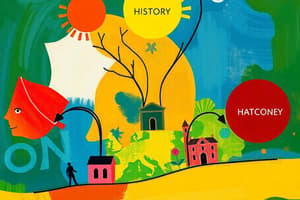Podcast
Questions and Answers
Why is it crucial to recognize biases when studying historical events?
Why is it crucial to recognize biases when studying historical events?
- To make the past more relatable to the present.
- To confirm pre-existing beliefs about the past.
- To evaluate historical accounts with a discerning eye. (correct)
- To ensure historical accounts are entertaining.
Which of the following is enhanced by the critical analysis of different perspectives in history?
Which of the following is enhanced by the critical analysis of different perspectives in history?
- A superficial understanding of singular events.
- A comprehensive and nuanced understanding of events. (correct)
- Simplified historical narratives that avoid complexity.
- The ability to quickly memorize dates and events.
Which skill is NOT typically fostered through the study of history?
Which skill is NOT typically fostered through the study of history?
- Communication.
- Problem-solving.
- Critical thinking.
- Memorizing facts. (correct)
What is one of the most important reasons why understanding history is useful?
What is one of the most important reasons why understanding history is useful?
Why is historical knowledge important to informed citizenship?
Why is historical knowledge important to informed citizenship?
What is the primary focus of economic history?
What is the primary focus of economic history?
What is a key technique used in primary source analysis?
What is a key technique used in primary source analysis?
What characteristic is often used to define different historical periods?
What characteristic is often used to define different historical periods?
How do historians approach the evaluation of evidence?
How do historians approach the evaluation of evidence?
What do overlapping events in history make challenging?
What do overlapping events in history make challenging?
Which aspect of history is studied under social history?
Which aspect of history is studied under social history?
What can influence the historical narratives created by scholars?
What can influence the historical narratives created by scholars?
What is often a misconception about historical interpretations?
What is often a misconception about historical interpretations?
Flashcards
Bias in Historical Accounts
Bias in Historical Accounts
Recognizing biases helps evaluate historical perspectives critically.
Critical Analysis
Critical Analysis
Examining different viewpoints improves understanding of historical significance.
Comprehensive Understanding
Comprehensive Understanding
A nuanced knowledge of events requires considering multiple viewpoints.
Skills Gained from Studying History
Skills Gained from Studying History
Signup and view all the flashcards
Historical Knowledge and Citizenship
Historical Knowledge and Citizenship
Signup and view all the flashcards
Definition of History
Definition of History
Signup and view all the flashcards
Significant Historical Periods
Significant Historical Periods
Signup and view all the flashcards
Primary Source Analysis
Primary Source Analysis
Signup and view all the flashcards
Secondary Source Analysis
Secondary Source Analysis
Signup and view all the flashcards
Branches of History
Branches of History
Signup and view all the flashcards
Historical Interpretation
Historical Interpretation
Signup and view all the flashcards
Contextual Understanding
Contextual Understanding
Signup and view all the flashcards
Challenges in Defining Historical Periods
Challenges in Defining Historical Periods
Signup and view all the flashcards
Study Notes
Introduction to History
- History is the study of past events, especially human activities.
- It covers a wide range of subjects, from individual lives to global trends.
- Historians use various sources, including written documents, archaeological artifacts, and oral traditions.
- Studying history helps us understand the present and predict the future.
- It aids individuals, communities, and nations in making informed decisions by learning from past experiences.
Historical Periods and Eras
- Historical periods are often defined by significant events, technological advancements, and societal changes.
- Examples include the Paleolithic Age, the Renaissance, the Industrial Revolution, and the Cold War.
- Each period possesses distinct characteristics. They are interconnected through both continuity and change.
- Studying these periods helps us understand long-term trends and patterns of human behavior.
- Defining precise start and end dates for historical periods can be challenging due to overlapping events and gradual transitions.
Historical Methods
- Historians use diverse methodologies to study historical events.
- Primary source analysis is crucial, examining original documents, letters, artifacts, and firsthand accounts.
- Secondary source analysis involves examining scholarly interpretations of events.
- Historians evaluate evidence critically, acknowledging potential biases and limitations in sources.
- Historical methods emphasize contextual understanding, considering the circumstances surrounding events.
Branches of History
- Branches like economic history, political history, and social history concentrate on specific aspects of the past.
- Economic history explores the relationship between economic systems and historical events.
- Political history investigates political systems, institutions, and figures through time.
- Social history examines social structures, relationships, and societal changes over time.
- Specialized fields in history are constantly evolving, enhancing our understanding of the past.
Historical Interpretation and Bias
- Historical interpretations are not objective; scholars' perspectives and biases influence their research.
- Historical narratives reflect the values and beliefs of the era and the individuals who create them.
- Recognizing bias allows for a critical assessment of historical accounts.
- Analyzing different viewpoints enhances understanding of the past and its significance.
- Studying history requires a careful consideration of multiple perspectives to develop thorough and nuanced insights into events.
Importance of History
- Studying history fosters essential skills like critical thinking, problem-solving, and communication.
- It allows for the evaluation of current events and the application of historical lessons to contemporary issues.
- Understanding the past is crucial for navigating current challenges and shaping the future.
- Historical knowledge guides decisions regarding social and political issues.
- Knowing history is essential for informed citizenship and societal progress.
Studying That Suits You
Use AI to generate personalized quizzes and flashcards to suit your learning preferences.




